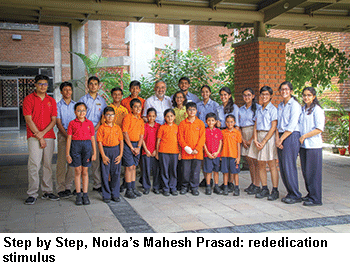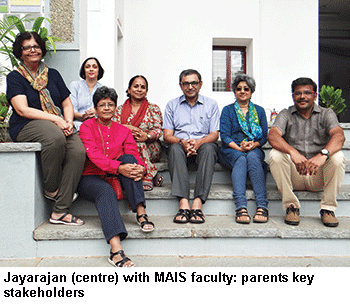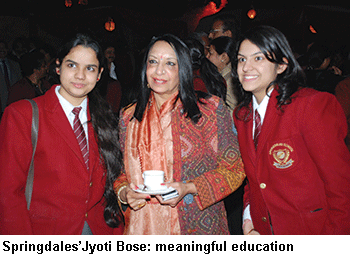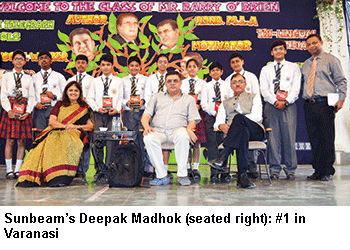Over 700 of India’s Top 1,000 schools rated and ranked in EWISR 2017-18 are co-ed day institutions. They are clearly the most preferred choice of middle class households countrywide
 Of India’s Top 1,000 schools rated on 14 parameters of education excellence by an unprecedented 12,367 sample respondents comprising parents, educationists, principals, teachers and senior school students countrywide for the EW India School Rankings 2017-18, over 700 are co-ed day schools. Assuming an average enrolment of 1,500 per school, over 1 million children are attending co-ed day schools clearly preferred by middle class India, who whatever cynical leftists and jholawalas say, will lead the country at least in business and industry — if not other walks of life — in the 21st century.
Of India’s Top 1,000 schools rated on 14 parameters of education excellence by an unprecedented 12,367 sample respondents comprising parents, educationists, principals, teachers and senior school students countrywide for the EW India School Rankings 2017-18, over 700 are co-ed day schools. Assuming an average enrolment of 1,500 per school, over 1 million children are attending co-ed day schools clearly preferred by middle class India, who whatever cynical leftists and jholawalas say, will lead the country at least in business and industry — if not other walks of life — in the 21st century.
However, it is pertinent to note that in the day schools category, city rankings followed by state and then national rankings in that order are of greater importance for parents. Given the reality that most of India’s states are as large and populous as entire foreign countries and that India itself is of the size and population of some continents, high state and city rankings are noteworthy achievements. They not only give schools ranked in the Top 10 in the states — and all schools included in the national league table — bragging rights, but also serve the purpose of role models to institutions that don’t make it into the Top 1,000 national table. Therefore, it’s useful to bear in mind that schools which may be modestly ranked in the national league table, could be highly ranked in cities and states.
Subject to these caveats and qualifications, India’s #1 co-ed day school of 2017-18 is the Noida (Delhi NCR)-based Step by Step (SbS, estb.2007). Ranked a modest #7 in 2015 and #4 last year, this year’s sample respondents have vaulted it to the top spot pushing last year’s #1, The Valley School, Bangalore to second position which it shares with the Vasant Valley School, Delhi, ranked #2 for the second time. The third spot is also shared by the Smt. Sulochanadevi Singhania School, Mumbai and Mallya Aditi International, Bangalore followed by The Shri Ram School, Vasant Vihar, Delhi at #4 and the Sanskriti School, Chanakyapuri, Delhi and Heritage School, Gurgaon, both ranked #5 who complete the Top 5. Further down the Top 10 table, Springdales, Dhaula Kuan, Delhi and Inventure Academy, Bangalore (both ranked #9) have improved their rankings to be included in the Top 10 which is completed by the CHIREC Public School, Hyderabad.
“We are a young institution just entering our tenth year. Therefore, we are delighted to learn that we have been ranked the country’s #1 co-ed day school in the prestigious EW India School Rankings. This honour has given us the stimulus to rededicate ourselves to keep providing the right type of learning opportunities to our students in an inclusive and caring environment to help them realise their maximum potential in consonance with our core values. Our constant endeavour is to keep innovating and developing a context-rich, engaging and experiential curriculum. It is this highly informed focus which enables our students to make sense of the uncertainties and complexities of a fast-changing world. And for this the entire credit needs to be given to our highly-committed teachers and very supportive parents community,” says Dr. Mahesh Prasad, a science, education and psychology alum of Delhi University and former principal of Noida’s Army Public School who was appointed principal of SbS in 2013.
 According to Prasad, the secret of SbS’ success is that the school management and faculty work diligently to adopt, adapt and innovate the best academic practices from around the world. “We are passionate believers in the dictum that if the process is rigorous, outcomes will be correspondingly good. Moreover, our excellent teacher-student ratio of 1:8 is a key enabler,” he adds. Currently this CBSE-affiliated school has 2,255 students mentored by 286 teachers on its muster rolls.
According to Prasad, the secret of SbS’ success is that the school management and faculty work diligently to adopt, adapt and innovate the best academic practices from around the world. “We are passionate believers in the dictum that if the process is rigorous, outcomes will be correspondingly good. Moreover, our excellent teacher-student ratio of 1:8 is a key enabler,” he adds. Currently this CBSE-affiliated school has 2,255 students mentored by 286 teachers on its muster rolls.
Likewise, Satish Jayarajan, principal of the Mallya Aditi International School, Bangalore (MAIS, estb.1984), ranked #3 pan-India, #1 in Karnataka (pop. 63 million) and in the hi-tech city of Bangalore, is content with the school’s high local and national ranking without “complacency or hubris”. “The survey results are encouraging, but we regard that MAIS as a work in progress. We reflect continuously on our systems and practice and consider how to do things better,” says Jayarajan, an alum of Bangalore and McGill (Canada) universities who has been principal of MAIS since 2003.
Jayarajan is especially pleased with the school’s #1 ranking on the parameter of parental involvement and high ratings on the criteria of co-curricular education and internationalism. “We regard parents as key stakeholders in the education process. We acknowledge that it takes a village to raise a child — and our parents community is our ‘village’. Moreover, activities such as dance, music, drama, art and sports are such an integral part of education that we are not comfortable with terms such as co-curricular and extra-curricular. In terms of internationalism, we have been fortunate to make meaningful engagements through our teacher and student exchange programmes. The summer school programme of the University of Chicago has been held in MAIS for the past two years and our students are routinely admitted into prestigious universities such as Cambridge, Yale, Chicago, Brown as well as the best Indian universities such as NALSAR and Ashoka,” adds Jayarajan.
Similarly, Dr. Jyoti Bose, an alu mna of the Delhi School of Economics and London School of Economics with a doctorate in education and peace studies from London Metropolitan University, and principal of Delhi’s highly-regarded Springdales School, Dhaula Kuan (SDDK, estb. 1983), is pleased this CBSE-affiliated K-12 school has been promoted to the national Top 10 table and #7 in Delhi NCR. “I would attribute our rising reputation to the fact that we are a relatively low-fee structure school which provides holistic and meaningful education without unnecessary gloss and glitter. Springdales is a happy school with a wonderfully supportive parents community which is in constant dialogue with the management and faculty. Our teachers and students are proud stakeholders who uphold high standards of excellence in whatever they set out to do,” says Bose who is particularly pleased that SDDK is top-ranked countrywide on the parameters of co-curricular education (“students learn to think out of the box”) and internationalism (“our school motto is vasudhaiv kutumbakam — the world is a family, and our foreign students and faculty exchanges go well beyond foreign travel”).
mna of the Delhi School of Economics and London School of Economics with a doctorate in education and peace studies from London Metropolitan University, and principal of Delhi’s highly-regarded Springdales School, Dhaula Kuan (SDDK, estb. 1983), is pleased this CBSE-affiliated K-12 school has been promoted to the national Top 10 table and #7 in Delhi NCR. “I would attribute our rising reputation to the fact that we are a relatively low-fee structure school which provides holistic and meaningful education without unnecessary gloss and glitter. Springdales is a happy school with a wonderfully supportive parents community which is in constant dialogue with the management and faculty. Our teachers and students are proud stakeholders who uphold high standards of excellence in whatever they set out to do,” says Bose who is particularly pleased that SDDK is top-ranked countrywide on the parameters of co-curricular education (“students learn to think out of the box”) and internationalism (“our school motto is vasudhaiv kutumbakam — the world is a family, and our foreign students and faculty exchanges go well beyond foreign travel”).
For reasons discussed above and the fact that it is very rare for families which prefer to send their children to day schools to move to cities with nationally top-ranked institutions merely for the children’s sake, city rankings are of  prime importance to households across the country. Therefore this time round C fore field personnel interviewed respondents in an unprecedented round of 27 cities for the EW India School Rankings 2017-18. Consequently it might be of some interest for readers to learn about top-ranked schools in cities apart from the metro schools which dominate the pure-play co-ed day schools (excluding co-ed day-cum-boarding schools) league table.
prime importance to households across the country. Therefore this time round C fore field personnel interviewed respondents in an unprecedented round of 27 cities for the EW India School Rankings 2017-18. Consequently it might be of some interest for readers to learn about top-ranked schools in cities apart from the metro schools which dominate the pure-play co-ed day schools (excluding co-ed day-cum-boarding schools) league table.
For instance, the City Montessori School, Gomti Nagar, Seth M.R. Jaipuria and Sunbeam, modestly ranked in the national league table, are the top three schools in Lucknow and Varanasi as also in Uttar Pradesh — India’s most populous (212 million) state. The Shishukunj International School, ranked #71 nationally, is the most admired co-ed day school in Indore (pop. 3.6 million) and Madhya Pradesh, India’s largest state by size (308,252 sq. km). Similarly, the DAV Public School, Unit VIII, ranked #132 nationally is top-ranked in Bhubaneswar (pop. 837,737), the administrative capital of the state of Odisha, and the Sat Paul Mittal School (71) is Punjab’s and Ludhiana’s top-ranked co-ed day school. Please see pg. 54 onward for day co-ed, boys and girls schools whose city rankings are of greater significance for parents and students than state or national rankings.
The point to note is that the demand for admissions into all top-ranked day schools — almost invariably privately-promoted — is a very difficult and stressful experience for parents and students. Hence their local importance needs to be acknowledged. The option of free-of-charge admission into state government schools is disregarded by the overwhelming majority of SEC (socio-economic category) ‘A’ class parents, teachers etc who constitute the sample respondents database of this survey. Even SEC ‘B’ ‘C’ and ‘D’ households prefer to send their children to India’s estimated 300,000 private budget schools — low fees-levying schools (ranked separately see p.300) — which are not ‘recognised’ by government for not being in compliance with infrastructure and administrative norms from which ironically the country’s 1.20 million government schools are exempt.
The obvious solution to the paradox of parents moving heaven and earth to secure the admission of their children in the country’s Top 1,000 — particularly 700 plus day schools — while fleeing free-of-charge government schools (over 50 percent of the country’s 260 million school-going children are enrolled in 320,000 private schools) is to encourage the growth and development of private budget schools clearly preferred by poorest households. Their promoters and managements need to be given soft loans to enable them to scale up to comply with the infrastructure and administrative requirements of the Right of Children to Free & Compulsory Education (RTE) Act, 2009 and the nit-picking demands of education officials of the state governments.
But in 21st century India’s neglected education sector — even as learned academics remain silent spectators — despite the election to office of the professedly pro-private enterprise BJP government at the Centre and in several states, old ideological battles are still being fought of which the prime casualties are the country’s unfortunate 480 million children.
To view EW India Co-ed Day Schools Rankings visit: http://www.educationworld.in/rank-school/all-cities/day-school/co-ed/2017.html